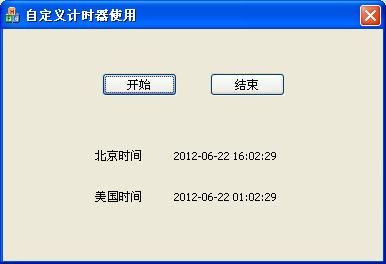c++自定义计时器使用
背景:在非窗口类中需要使用定时器,来实现心跳检测功能。
参考:
http://blog.csdn.net/bookish_2010_prj/article/details/6631938
http://blog.sina.com.cn/s/blog_4dbcd2730100xc69.html
核心API:SetTimer。
vs2005创建对话框示例工程。
MyTimer.cpp如下。
对话框类实现MyTimerUseDlg.h。
对话框类实现MyTimerUseDlg.cpp。
参考:
http://blog.csdn.net/bookish_2010_prj/article/details/6631938
http://blog.sina.com.cn/s/blog_4dbcd2730100xc69.html
核心API:SetTimer。
vs2005创建对话框示例工程。
效果图如下。
自定义计时器,不依赖窗口类,封装计时器的生成和释放。
MyTimer.h如下。
/*
非窗口类实现定时器
参考:
http://blog.csdn.net/bookish_2010_prj/article/details/6631938
http://blog.sina.com.cn/s/blog_4dbcd2730100xc69.html
*/
#pragma once
#include <map>
using namespace std;
class CMyTimerUseDlg;
typedef map<UINT, CMyTimerUseDlg*> COwnerMap;
class CMyTimer
{
public:
CMyTimer();
virtual ~CMyTimer();
//设置定时器,nElapse表示时间间隔
void SetMyTimer(UINT nElapse, CMyTimerUseDlg* pOwner);
//销毁该实例的定时器
void KillMyTimer();
//获取定时器ID
UINT GetTimerID();
private:
//静态成员函数,用于处理定时器的消息
static void CALLBACK MyTimerProc(HWND hwnd,UINT uMsg,UINT idEvent,DWORD dwTime);
private:
//静态数据成员,映射表类,用于保存定时器拥有者
static COwnerMap m_sTimeMap;
//保存该实例的定时器标志值
UINT m_nTimerID;
};
MyTimer.cpp如下。
#include "StdAfx.h"
#include "MyTimer.h"
#include "MyTimerUseDlg.h"
COwnerMap CMyTimer::m_sTimeMap;
CMyTimer::CMyTimer()
: m_nTimerID(-1)
{
}
CMyTimer::~CMyTimer()
{
}
void CALLBACK CMyTimer::MyTimerProc(HWND hwnd, UINT uMsg, UINT idEvent, DWORD dwTime)
{
CMyTimerUseDlg* pOwner = m_sTimeMap[idEvent];
if (pOwner != NULL)
{
pOwner->RefreshTime(idEvent);
}
}
void CMyTimer::SetMyTimer(UINT nElapse, CMyTimerUseDlg* pOwner)
{
if (m_nTimerID != -1)
{
//定时器已经设置则返回
return;
}
m_nTimerID = (UINT)SetTimer(NULL,NULL,nElapse,MyTimerProc);
m_sTimeMap[m_nTimerID] = pOwner;
}
void CMyTimer::KillMyTimer()
{
KillTimer(NULL, m_nTimerID);
COwnerMap::iterator mFindPos = m_sTimeMap.find(m_nTimerID);
if (mFindPos != m_sTimeMap.end())
{
m_sTimeMap.erase(mFindPos);
}
m_nTimerID = -1;
}
UINT CMyTimer::GetTimerID()
{
return m_nTimerID;
}
对话框类实现MyTimerUseDlg.h。
// MyTimerUseDlg.h : header file
//
#pragma once
#include "MyTimer.h"
#include "resource.h"
// CMyTimerUseDlg dialog
class CMyTimerUseDlg : public CDialog
{
// Construction
public:
CMyTimerUseDlg(CWnd* pParent = NULL); // standard constructor
// Dialog Data
enum { IDD = IDD_MYTIMERUSE_DIALOG };
protected:
virtual void DoDataExchange(CDataExchange* pDX); // DDX/DDV support
// Implementation
public:
void RefreshTime(UINT idEvent);
protected:
HICON m_hIcon;
// Generated message map functions
virtual BOOL OnInitDialog();
afx_msg void OnSysCommand(UINT nID, LPARAM lParam);
afx_msg void OnPaint();
afx_msg HCURSOR OnQueryDragIcon();
afx_msg void OnBnClickedStart();
afx_msg void OnBnClickedEnd();
DECLARE_MESSAGE_MAP()
private:
CMyTimer m_ChinaTimer;
CMyTimer m_USATimer;
};
对话框类实现MyTimerUseDlg.cpp。
// MyTimerUseDlg.cpp : implementation file
//
#include "stdafx.h"
#include "MyTimerUse.h"
#include "MyTimerUseDlg.h"
#ifdef _DEBUG
#define new DEBUG_NEW
#endif
// CMyTimerUseDlg dialog
CMyTimerUseDlg::CMyTimerUseDlg(CWnd* pParent /*=NULL*/)
: CDialog(CMyTimerUseDlg::IDD, pParent)
{
m_hIcon = AfxGetApp()->LoadIcon(IDR_MAINFRAME);
}
void CMyTimerUseDlg::DoDataExchange(CDataExchange* pDX)
{
CDialog::DoDataExchange(pDX);
}
BEGIN_MESSAGE_MAP(CMyTimerUseDlg, CDialog)
ON_WM_SYSCOMMAND()
ON_WM_PAINT()
ON_WM_QUERYDRAGICON()
//}}AFX_MSG_MAP
ON_BN_CLICKED(IDC_BTN_START, &CMyTimerUseDlg::OnBnClickedStart)
ON_BN_CLICKED(IDC_BTN_END, &CMyTimerUseDlg::OnBnClickedEnd)
END_MESSAGE_MAP()
// CMyTimerUseDlg message handlers
BOOL CMyTimerUseDlg::OnInitDialog()
{
CDialog::OnInitDialog();
// Add "About..." menu item to system menu.
// IDM_ABOUTBOX must be in the system command range.
ASSERT((IDM_ABOUTBOX & 0xFFF0) == IDM_ABOUTBOX);
ASSERT(IDM_ABOUTBOX < 0xF000);
CMenu* pSysMenu = GetSystemMenu(FALSE);
if (pSysMenu != NULL)
{
CString strAboutMenu;
strAboutMenu.LoadString(IDS_ABOUTBOX);
if (!strAboutMenu.IsEmpty())
{
pSysMenu->AppendMenu(MF_SEPARATOR);
pSysMenu->AppendMenu(MF_STRING, IDM_ABOUTBOX, strAboutMenu);
}
}
// Set the icon for this dialog. The framework does this automatically
// when the application's main window is not a dialog
SetIcon(m_hIcon, TRUE); // Set big icon
SetIcon(m_hIcon, FALSE); // Set small icon
// TODO: Add extra initialization here
return TRUE; // return TRUE unless you set the focus to a control
}
void CMyTimerUseDlg::OnSysCommand(UINT nID, LPARAM lParam)
{
if ((nID & 0xFFF0) == IDM_ABOUTBOX)
{
}
else
{
CDialog::OnSysCommand(nID, lParam);
}
}
// If you add a minimize button to your dialog, you will need the code below
// to draw the icon. For MFC applications using the document/view model,
// this is automatically done for you by the framework.
void CMyTimerUseDlg::OnPaint()
{
if (IsIconic())
{
CPaintDC dc(this); // device context for painting
SendMessage(WM_ICONERASEBKGND, reinterpret_cast<WPARAM>(dc.GetSafeHdc()), 0);
// Center icon in client rectangle
int cxIcon = GetSystemMetrics(SM_CXICON);
int cyIcon = GetSystemMetrics(SM_CYICON);
CRect rect;
GetClientRect(&rect);
int x = (rect.Width() - cxIcon + 1) / 2;
int y = (rect.Height() - cyIcon + 1) / 2;
// Draw the icon
dc.DrawIcon(x, y, m_hIcon);
}
else
{
CDialog::OnPaint();
}
}
// The system calls this function to obtain the cursor to display while the user drags
// the minimized window.
HCURSOR CMyTimerUseDlg::OnQueryDragIcon()
{
return static_cast<HCURSOR>(m_hIcon);
}
void CMyTimerUseDlg::OnBnClickedStart()
{
m_ChinaTimer.SetMyTimer(1000, this);
m_USATimer.SetMyTimer(1000, this);
}
void CMyTimerUseDlg::OnBnClickedEnd()
{
m_ChinaTimer.KillMyTimer();
m_USATimer.KillMyTimer();
}
void CMyTimerUseDlg::RefreshTime(UINT idEvent)
{
UINT nChinaID = m_ChinaTimer.GetTimerID();
UINT nUSAID = m_USATimer.GetTimerID();
if (idEvent == nChinaID)
{
CTime sysTime = CTime::GetCurrentTime();
SetDlgItemText(IDC_CHINA_TIME, sysTime.Format(_T("%Y-%m-%d %H:%M:%S")));
}
else if (idEvent == nUSAID)
{
//太平洋时间与北京时间,15个小时时差
CTime sysTime = CTime::GetCurrentTime();
CTimeSpan timeSpan = CTimeSpan(0, 15, 0, 0);
sysTime -= timeSpan;
SetDlgItemText(IDC_USA_TIME, sysTime.Format(_T("%Y-%m-%d %H:%M:%S")));
}
}
